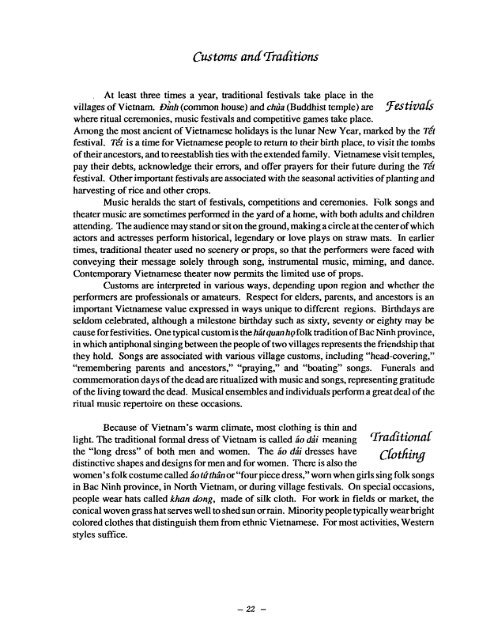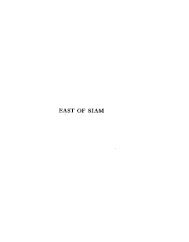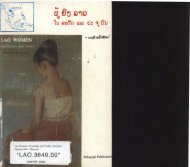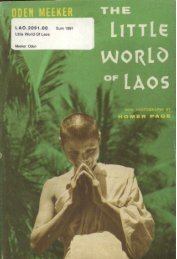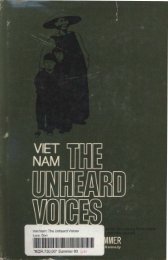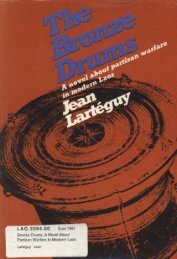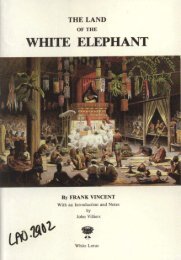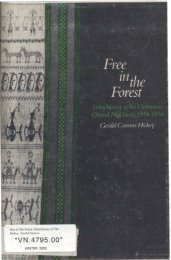and Temple Yards
iutnam From Rice Paddies and Temple Yards - Refugee Educators ...
iutnam From Rice Paddies and Temple Yards - Refugee Educators ...
- No tags were found...
You also want an ePaper? Increase the reach of your titles
YUMPU automatically turns print PDFs into web optimized ePapers that Google loves.
At least three times a year, traditional festivals take place in the<br />
villages of Vietnam. D& (common house) <strong>and</strong> chfia (Buddhist temple) are Festivd<br />
where ritual ceremonies, music festivals <strong>and</strong> competitive games take place.<br />
Among the most ancient of Vietnamese holidays is the lunar New Year, marked by the T&<br />
festival. T& is a time for Vietnamese people to return to the& birth place, to visit the tombs<br />
of their ancestors, <strong>and</strong> to reestablish ties with the extended family. Vietnamese visit temples,<br />
pay their debts, acknowledge their errors, <strong>and</strong> offer prayers for their future during the T&<br />
festival. Other important festivals are associated with the seasonal activities of planting <strong>and</strong><br />
harvesting of rice <strong>and</strong> other crops.<br />
Music heralds the start of festivals, competitions <strong>and</strong> ceremonies. Folk songs <strong>and</strong><br />
theater music are sometimes performed in the yard of a home, with both adults <strong>and</strong> children<br />
attending. The audience may st<strong>and</strong> or sit on the ~ound, making a circle at the center of which<br />
actors <strong>and</strong> actresses perform historical, legendary or love plays on straw mats. In earlier<br />
times, traditional theater used no scenery or props, so that the performers were faced with<br />
conveying their message solely through song, instrumental music, miming, <strong>and</strong> dance.<br />
Contemporary Vietnamese theater now permits the limited use of props.<br />
Customs are interpreted in various ways, depending upon region <strong>and</strong> whether the<br />
performers are professionals or amateurs. Respect for elders, parents, <strong>and</strong> ancestors is an<br />
important Vietnamese value expressed in ways unique to different regions. Birthdays are<br />
seldom celebrated, although a milestone birthday such as sixty, seventy or eighty may be<br />
cause for festivities. One typical customis the h~iquanhpfolk tradition of Bac Ninh province,<br />
in which antiphonal singing between the people of two villages represents the friendship that<br />
they hold. Songs are associated with various village customs, including "head-covering,"<br />
"remembering parents <strong>and</strong> ancestors," "praying," <strong>and</strong> "boating" songs. Funerals <strong>and</strong><br />
cornmemoration days of the dead are ritualized with music <strong>and</strong> songs, representing gratitude<br />
of the living toward the dead. Musical ensembles <strong>and</strong> individuals perform a great deal of the<br />
ritual music repertoire on these occasions.<br />
Because of Vietnam's warm climate, most clothing is thin <strong>and</strong><br />
light. The traditional formal dress of Vietnam is called lo dii meaning %dt~naC<br />
the "long dress" of both men <strong>and</strong> women. The io dii dresses have<br />
chthittB<br />
distinctive shapes <strong>and</strong> designs for men <strong>and</strong> for women. There is also the<br />
women's folk costume called go tathiin or "four piece dress," worn when girls sing folk songs<br />
in Bac Ninh province, in North Vietnam, or during village festivals. On special occasions,<br />
people wear hats called khan dong, made of silk cloth. For work in fields or market, the<br />
conical woven grass hat serves well to shed sun or rain. Minority people typically wear bright<br />
colored clothes that distinguish them from ethnic Vietnamese. For most activities, Western<br />
styles suffice.


